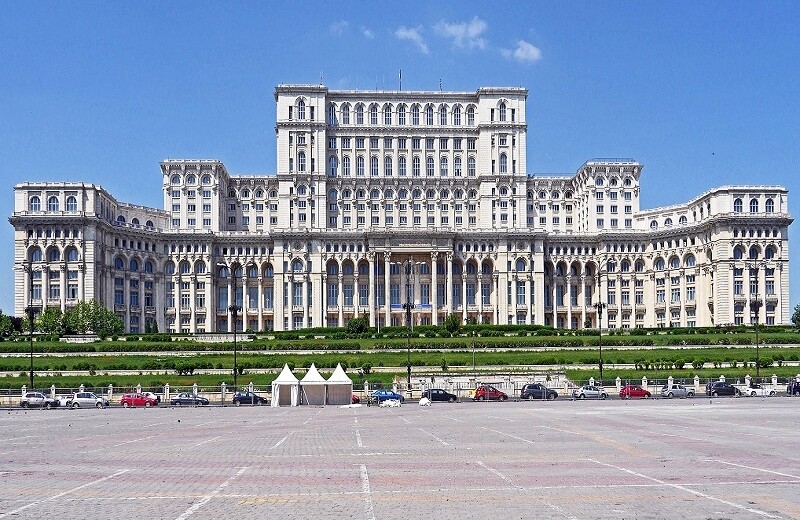As the North Atlantic Alliance (NATO) foreign ministers gather this week in Washington to mark the 70th anniversary of the most successful military alliance in history, trouble is brewing over Brexit and the rise of populism in the western front and the challenges brought by autocratic leaders on its eastern front. Democratic backsliding, particularly in Turkey, Poland, and Hungary, has painted a bleak picture for the shared values-centered rationale of the alliance. Not unlike its troubled neighbors, Romania also presents its own frailty with regards to the challenged independence of its justice system and its defanged prosecution of high-level corruption.
This week, together with six other former communist bloc countries, Romania marks the 15th anniversary of its NATO accession. It has a lot to offer for the future of the alliance if only it can purge its own shadowy figures and stymie the wave of unfettered corruption that threaten its stability and that of the alliance. If it succeeds in getting its act together the country's pro-U.S. posture and diplomacy may never have weighed more in anchoring Euro-Atlantic stability.
Romania's newly tapped offshore gas resources have the potential to soon deliver the prospect of continental energy security aligned with U.S. strategic interests. A realist, business-centered argument could prop eroded trust in the joint democratic values-based solidarity that has been historically affirmed as the core rational for NATO's existence. Without respect for those bedrock democratic values and institutions that instill trust and predictability among allies, security investments in joint infrastructure projects ring hollow.
While Romania may yet prove itself to be worthy of taking on a vital role at the heart of the Black Sea regional security it is currently weak, embroiled in an anti-graft institutional showdown, a battered bid to remove sleaze-indicted power brokers from parliamentary seats, and bureaucratic influence. There are attempts by the ruling coalition to use emergency powers ordinances, supposedly in the name of urgent national interest, to instill a regime of mass amnesty and pardon corruption-indicted politicians. Massive street protests over the years against unfettered corruption have done little to deter the ruling Romanian elite from averting a course of action that saps the country's credibility amongst allies. If it now succeeds to reduce the security vulnerability brought about by high-level corruption, Romania does have the means to align U.S. strategic and business interests within the continued anchoring of European democracy and regional security.
While the Trump administration applauds the security and economic commitment of the country as an ally, it has also remained steadfast, continuing the line of previous U.S. administrations in pointing out that Romania's credibility as a pivotal EU and U.S. geostrategic partner on the Black Sea hinges on its continued fight against high-level corruption. Even in the context of the celebratory pageantry of NATO members gathering in Washington, Secretary of State Michael Pompeo made sure to remind Romania's visiting foreign minister that endemic local corruption is undermining "democratic institutions and promotes adversaries' malign influence," a euphemism for Russian interference.
The logic applies that if the country is unable to rein in political instability and fight high-level corruption at the express consistent behest of both Washington and EU allies, how could it be entrusted by partners with a central role in their security structure and power projection capability? U.S. military presence and substantial investment in military bases, both in Romania and Bulgaria, certainly indicate a U.S. willingness to commit to these countries' defense, but if boots on the ground carry no weight and if there is no political will in defining consistent, predictable Romanian national interests, the project of U.S.-led economic investment in the region appears doomed. Romania will have the chance to signal its commitment to the consolidation of its democratic institutions and deliver an answer to Washington and EU member allies by May 26. The date is set not just for the momentous European Parliament (EP) elections, which may yet be technically marred in the country, but also for a national referendum called upon by Romania's president over justice and anti-graft reforms.
Amidst internal political instability, Romania assumed the six-months presidency of the EU Council in January, during what might turn out to be one of the most pivotal moments in the history of continental and trans-Atlantic cohesion. The Romanian EU presidency, the first since its joining the union in 2007, must face the impending Brexit aftermath, the upcoming European Parliament (EP) elections on May 26, and the EU budget negotiations that will set the financial course of the union for the next seven years. The EU budget negotiations, a battleground where all members' national demands are to be hashed out, will likely have to be placed on "technical pause" while the union absorbs Brexit uncertainty. These negotiations, a boon for populist rhetoric and grandstanding, should probably not take place around the time of the EU Parliamentary elections which are heralded to bring a blow to centrist parties and accommodate further the rise of populists. By the time EP elections take place, Brexit, irrespective of its form, will have likely impacted the continent through the reduction and reapportionment of EU Parliament seats among the remaining 27 states, creating much turmoil and widening the already loose playing field for autocratic prone leaders on the eastern flank of the alliance. Ahead of the gathering storm, on May 9, in the hopes of sorting out through the likely tectonic power-shift towards a more continentally inward-looking union, Romania will host an EU Summit in Sibiu, the multi-ethnic Transylvanian hometown of Romanian President Klaus Iohannis.
Romania's novice status at the helm of European Union compounds what is likely to be a difficult feat of diplomatic maneuvering in accommodating all players in diverse national polities and instill a sense of continental cohesion. With the sixth largest population in a post-Brexit EU, Romania is a safe place for the post-EP elections summit negotiations. Its electorate is actually one of the most pro-EU integration electorates out there, a popularity not to be ignored in times of heightened skepticism of EU institutions. Some five or six million Romanians live and work abroad, the majority dependent on the labor mobility guaranteed by the EU and thus dependent on liberal values of inclusivity and tolerance. The pro-EU sentiment in the country is only seconded by its pro-U.S. views, especially on security matters but also in terms of its strategic business orientation. Just over 100 years ago, following World War I, U.S. President Woodrow Wilson's Fourteen Points provided the essential compass for peace terms that led to the self-determination of a number of central European nations, including the unification of demographically Romanian provinces into the modern state it is today. A country forged on the borderlands of imploded empires, Romania had its sovereignty repeatedly undermined through territorial grabs and military occupations at the hands of continental strongmen with both fascist and socialist totalitarian visions for continental order. It is a country still vividly traumatized and suspicious of Russia, especially of Molotov-Ribbentrop and Yalta type deals that seal the fates of smaller European nations. After a tumultuous century and at 30 years since the fall of communism, the country's electorate endorses a vision for the country as a stalwart, pro-American geostrategic ally within the wider region and in the heart of the EU itself.
The stakes are high for Romania not to be derailed by political brinkmanship and to send a clear signal that it is irreversibly committed to upholding the rule of law and the joint security of the alliance. Its military and secret service institutions have painstakingly sought to prove themselves worthy of trust, boasting an impeccable track record of substantial presence on all of NATO's theaters of operation over the last 15 years, including currently in Afghanistan and Kosovo. Romania is most importantly host to the alliance's joint missile defense system, with implications for the security of the wider Black Sea region, a region that is likely to define NATO's raison d'être for years to come.
The country's diplomacy may not seem to have the credentials to rise to the moment but it has delivered against odds in the past. It shouldn't be ignored that despite visits from other clamoring EU member presidents it was only during President Iohannis' visit to Washington in June 2017 that President Trump finally committed to reaffirming NATO's Article 5 that an attack on one alliance member is an attack against all. Romania had a good footing to seek this commitment being among the first and few allies to increase defense spending at 2 percent of its GDP and embarked on a decade-long ambitious upgrading of its military capability, much of it oriented towards defense contracts compatible with American interests and operations throughout the region.
The loss of the UK will be a blow to the EU in geostrategic and economic terms but it will also shift continental gravity potentially centering on the sustainable economic growth of central EU member states that welcome U.S.leadership and strategic business investments in the region. In coordination with Poland, the fifth largest nation in the EU, the Baltic States, and other central European states, Romania is a leading supporter of the Three Seas Initiative (Adriatic, the Baltic and the Black Seas, a.k.a. TSI), a diplomatic tool and business forum refocusing the EU on achieving economic cohesion and coordination among member states in pursuit of their strategic interests as a bloc. In total, 12 EU member countries make up this forum and with the exception of Austria, all others were part of the communist bloc. Germany holds an observer status within the TSI, monitoring the group's potential stances on common interests in deepening integration of their energy, transport, and telecommunications infrastructure within the EU. The bloc brings together the fastest growing economies of the EU, a common area of interest for both German and U.S. investments and leadership. Romania's President Iohannis hosted the second TSI regional summit last September, reiterating that one of the top goals of the gathering was to "maintain the support of the USA in a transatlantic-unity approach and further explore potential synergies with stakeholders outside the region." This was clear language for inviting U.S. political leadership and U.S. businesses as stakeholders in shaping the economic development of the region.
The presence of newly discovered gas reserves on Romania's Black Sea offshore sovereign territory, explorations conducted by American companies, yielded indications of serious reserves with potential strategic implications. These estimated reserves are expected to provide an alternative to the monopolistic positioning of Russian gas on the EU market. Romania is not yet at a stage of pipeline connectivity or full exploitation but it is rapidly moving in that direction in an attempt to consolidate the country's energy security. It may soon, with the U.S. support, address energy security for the TSI bloc. It is not a coincidence that in mid-March Russia announced it is sending nuclear-capable bombers to Crimea in response to U.S. deploying of U.S. Aegis Ashore missile-defense systems to Romania. Russian bombers stationed less than 150 miles from Romania's Black Sea shores, with the envisioned gas offshore platforms in the middle, provides a succinct picture of the new U.S. posture on the continent and future relevance of the alliance. Romania's security stance and strategic business relationship with the U.S. may prove to be a model for Ukrainian elites and electorate, driving home the economic impact of Russia's seizure of Crimea in denying Ukraine three-quarters of its maritime offshore resources. Russia's weaponization of access to energy resources throughout Europe has been something Romanian diplomacy has been warning about for many years. Having secured its own liquified natural gas (LNG) terminal on the Black Sea coast, the country is now well on its way in becoming self-sufficient again in gas as well as a potential supplier of both local and U.S. LNG, should countries in the region become the victims of monopolistic practices. U.S. LNG strategic assistance would however depend on maritime secure transports on the Black Sea and that brings back into focus Turkey's worrisome estrangement within NATO.
In its first months of EU Presidency Romania's diplomacy has used its newly gained influence in the union as well as its economic and historic ties with Turkey to bring the latter back to the negotiating table. Under the Romanian EU presidency, in mid-March, the EU-Turkey Association Council met for the first time in almost four years, the first such talks since the alleged coup attempt that served to consolidate the autocratic regime of President Recep Tayyip Erdoğan. With some 15,000 Turkish companies operating in Romania, the latter is one of Turkey's largest export markets in the region. Romania's support for Turkey's continued accession talks within the EU was however primarily a diplomatic tool to offset the increased prospects of Turkey's decoupling from NATO's security structures.
Romania is likely troubled but realistic about the increasingly antagonistic Turkish relationship with the U.S. and EU allies. Bringing back Turkey into the fold may not be realistically possible and this only underscores the pivotal role Romania might have to play in NATO's potential retrenchment. Turkey has recently sealed its rapprochement with Russia, not just through the Turkish Stream gas pipeline that politically controls Russian gas distribution to European countries, but most poignantly Turkey opted to purchase Russian missile defense systems S-400 Triumf. The hefty $2.5 billion deal between chummy autocrats, is set to deliver powerful anti-aircraft Russian technology to Turkey by July. As a result, the U.S. scrapped Turkey's order of 30 F-35 stealth fighters and the envisioned 100 planes that were to be produced by Lockheed Martin Corporation. (See also "U.S. blocks Turkey's F-35 equipment over S-400 deal with Russia.")
The future of NATO's interoperability is at stake. With Turkey going astray, NATO has two feet to stand on in the Black Sea and one of them might be slightly wobbly. Apprehensive about its historic and economic ties with Russia, Bulgaria has been shy to support NATO's response in the militarization of the eastern flank with U.S. technology. Days after a recent visit by NATO Secretary-General Jens Stoltenberg, Bulgaria received the visit of Russian Prime Minister Dmitry Medvedev and a public warning that Sofia will be cut from receiving gas through the Turkish Stream if it opts to buy nuclear-capable U.S. F-16 jets. As a result, Bulgaria is considering opting for the purchase of non-nuclear-capable Swedish Gripen jets.
Romania alone cannot replace Turkey within the alliance; it simply does not have the military, demographic and economic muscle to do so alone but it can prove to be a resilient outpost for U.S. interests within the region. Through the TSI interconnectivity of strategic infrastructure, the countries of the bloc may, with U.S. leadership, rally the support needed for effective NATO responses in years ahead.
For Romania to become the envisioned pivotal regional leg on which the alliance relies, it must address its internal vulnerabilities and allow prosecutors to professionally pursue the apolitical purging of corrupt officials that pose a risk to the stability of the country and the alliance as a whole. This is not just a demand coming from allied capitals, it is a mandate made repeatedly clear through unprecedented mass street protests unparalleled since the collapse of the communist regime. The last few years have proven that the established governing parties remain incapable of sidelining corrupted power brokers among their ranks, that only independent prosecutors and the early ballot box may move entrenched corrupt public figures to step aside. The internal politics of the country are becoming an increasingly serious liability for regional stability if corruption is allowed to fester. There is a political showdown underway and it will likely play out democratically at the voting booths through this announced referendum on the very same day as the EP elections will be held on May 26. At play will be the very vision of the country at the core of western security and prosperity or secluded at whims of autocrats and the personal interests of a few provincial politicians. U.S. power projection and NATO operability in the region simply cannot afford a watered-down mish-mash of both governing models.




